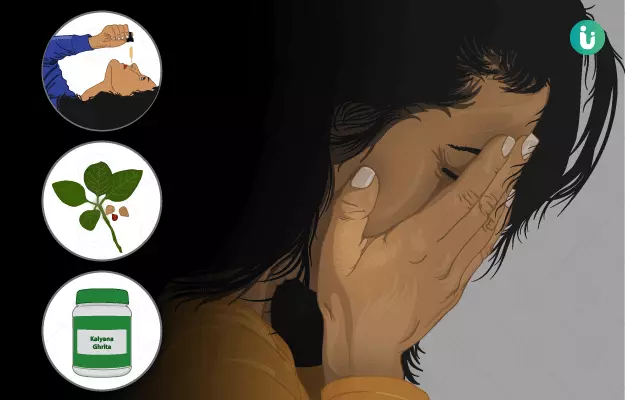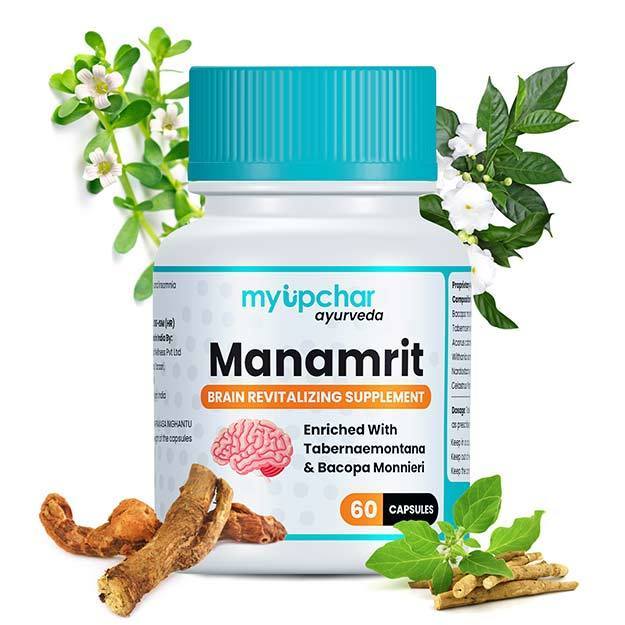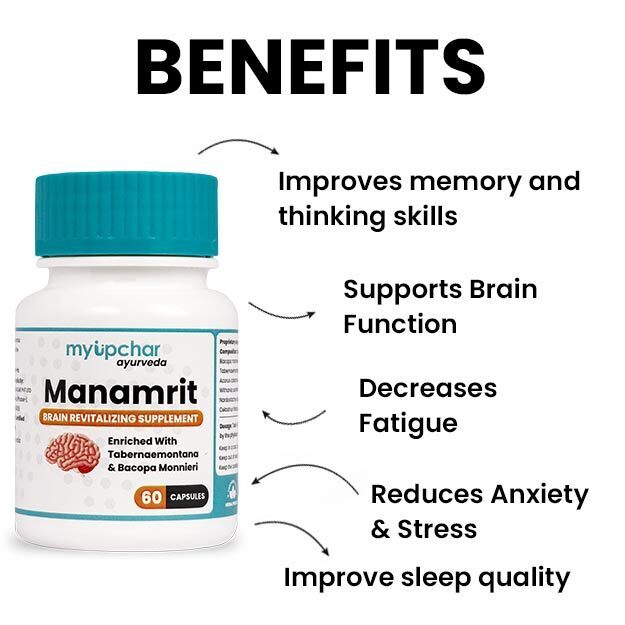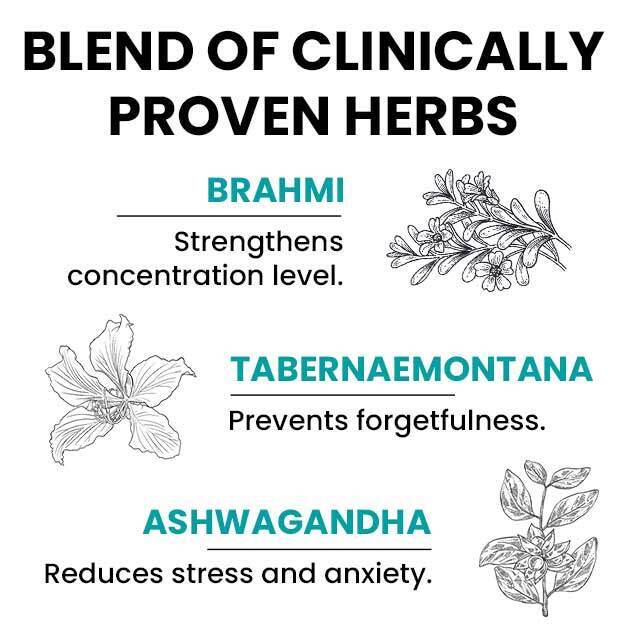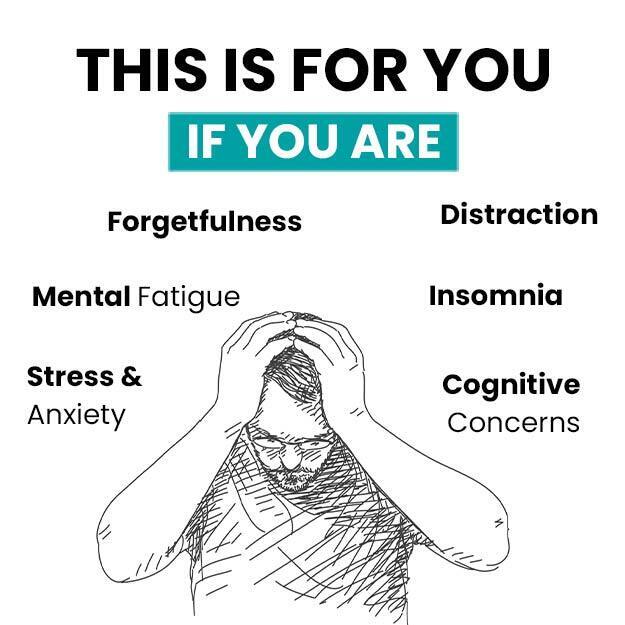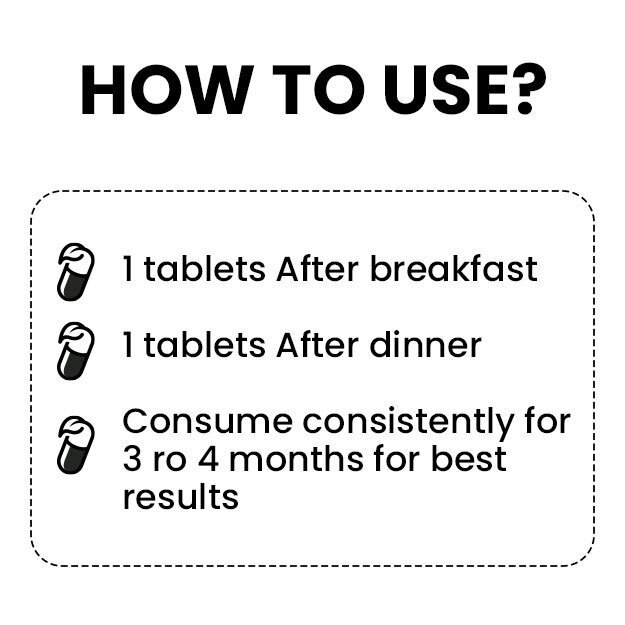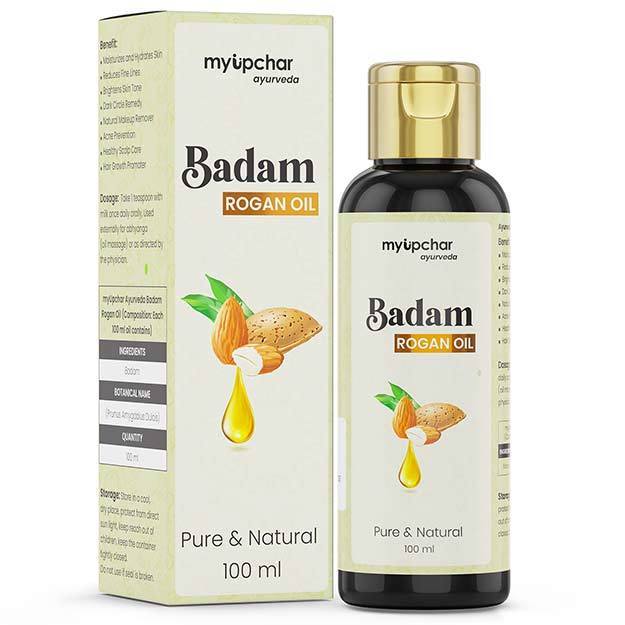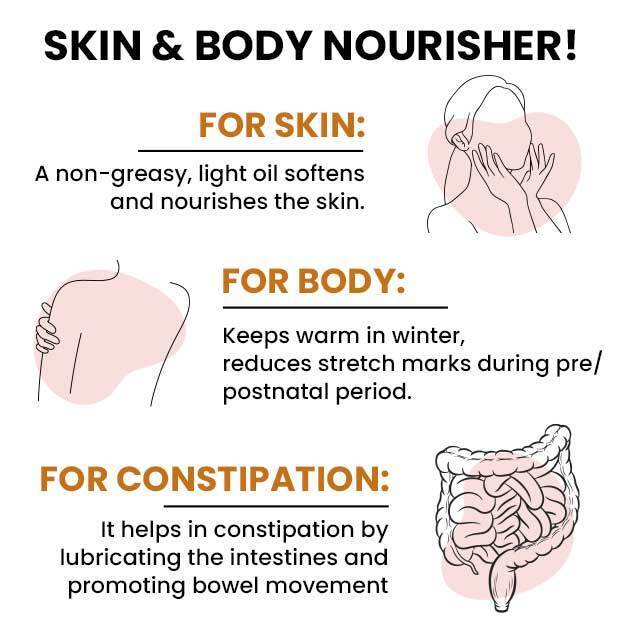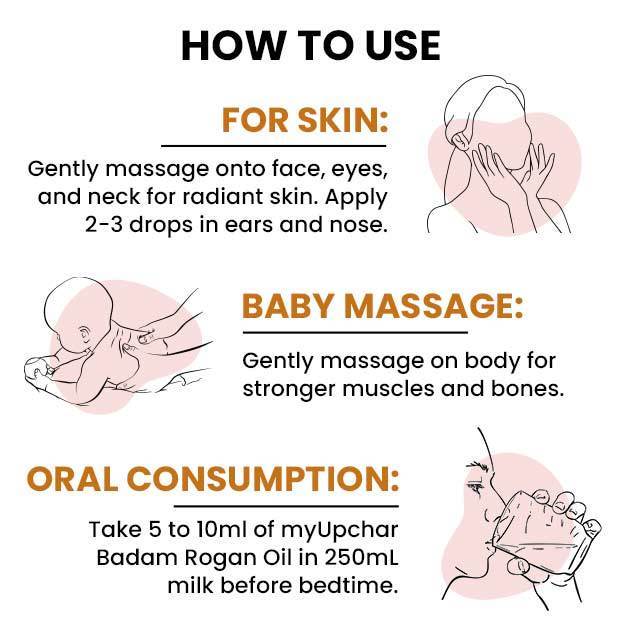Depression is a mood disorder wherein a person persistently feels hopeless or sad. It brings down energy levels and hampers the health of an individual along with a loss in interest in day to day activities. Currently, about 80% of people with depression do not undergo treatment and the prevalence of depression is still a social stigma in some places. Ayurveda gives prime concern to mind-related disorders and defines depression or manovasad as a state of manasika vyadhi (disease of the mind) and manasika bhava (emotions).
Ayurvedic procedures like shirodhara (pouring liquids or oils over the head), vamana (medical emesis), and rasayana (rejuvenative) treatment help relieve mental stress, draw out toxins, and relax the mind. Along with Ayurvedic herbs like ashwagandha (Indian ginseng), vacha (calamus), yasthimadhu (mulethi), brahmi (waterhyssop) and shatavari (hundred roots), and Ayurvedic medicines like saraswatarishta and chandanasava, practising relaxation methods like yoga help manage depression better. Ayurveda also describes dietary changes like including whole foods, fresh vegetables and excluding non-vegetarian meals and tinned/canned foods to improve overall health and manage depression effectively.
- Ayurvedic view of depression
- Ayurvedic treatment for depression
- Ayurvedic herbs and medicines for depression
- Dietary and lifestyle changes for depression as per ayurveda
- How effective are ayurvedic medicines and treatments for depression
- Side effects and risks of ayurvedic medicine and treatments for depression
- Takeaway
Ayurvedic view of depression
According to Ayurvedic principles, consideration of factors such as manasika dosha (attributes of the psyche), agni (digestive fire), jnanendriya (sensory organs), sharirika dosha (bodily humour) and ojas (vital essence of life) plays a significant role in diagnosing depression. Depression is categorized into various types- mild depression, major depression, seasonal affective disorder, bipolar disorder and dysthymia. Academic pursuits, financial problems, long-term illnesses like diabetes and cancers can cause depression. According to Ayurveda, vitiation in either the vata or the kapha doshas leads to depression.
Asiddhi bhaya (anxiety or fear of failure), chittodvega (anxiety), avasada (hopelessness), dukhita (grief-stricken, sad or distressed), a wandering mind and vishanna (sorrow or dejection) are some of the mental symptoms seen in people with depression. Tvakparidaha (burning sensation of the skin), sidanti gatrani (fatigue), roma harsha (goosebumps), prasveda (excessive perspiration), vepathu (tremor), and mukha shosha (dryness of the mouth) are some of the physical symptoms observed in people with depression.
Ayurvedic doctors recommend samadhi (diverting the mind from the causes and developing self-control), smriti (sharing experiences), dhairya (reassurance), and vijnana (proved sciences) to manage depression. Imparting jnana (personal awareness), harshana (motivating) and satvavajaya (counselling) may also help improve depression.
Shirodhara, virechana (purgation), basti (enema) and other procedures with medicinal oils and formulations are suggested for improving symptoms in case of depression. Herbs like brahmi, ashwagandha, and shatavari act as brain tonics and help manage depression.
Ayurvedic treatment for depression
- Shirodhara
- Shirodhara is a part of panchakarma (five therapies) that is useful in treating diseases of the mind, nose, ears, and eyes. Shirodhara aims at treating depression symptoms like excess perspiration and insomnia.
- The process includes pouring warm medicated oils on the forehead. It is known to provide relaxation and give a divine feeling to an individual. During the therapy, lights with soft colours, aromas and incense sticks, and soothing music are used to maintain a calm and relaxing environment and to achieve better healing.
- Shirodhara using buttermilk is specifically used in people with depression. Shiro abhyanga (head massage) using medicated oils is also recommended for the treatment of depression.
- Shodhana (purification)
The following shodhana therapies are recommended in people with depression:
- Nasya
- Ayurveda recommends nasya therapy for treating depression as nasal insufflation can help provide relief from diseases that affect the head and senses, e.g., convulsions, paralysis, speech disorders, migraines and depression. Nasya therapy is also used to tone and strengthen the head and senses.
- Nasya with herbs having tikshna (incisive) properties is given with hingu ghrita (a preparation of asafoetida and clarified butter), and panchagavya ghrita for treating depression.
- Vamana
- Vamana helps eliminate ama (toxins) from the stomach and mucus from naadis (channels). It provides relief in people who have head and sinus diseases, insanity, nausea and difficulty in breathing.
- Performing vamana using dhamargava (sponge gourd) after completing the procedure of snehapana (consuming oil or ghrita) with panchagavya ghrita is suggested in people with depression.
- Virechana
- Virechana method includes consuming purgative herbs like rock sugar, senna, rhubarb and shunthi (ginger) to draw out toxins. It also provides relief from many conditions including obstructed faeces, bleeding disorders, chronic fevers and pain.
- Virechana with trivrita (Indian jalap) lehya (lickable) and avipatikara powder is beneficial in people with depression.
- Basti
- Basti is useful in strengthening and improving the function of colon using enemas. Herbal tonics and formulations are given to draw out toxins and improve overall health by rejuvenating and healing the body from various ailments.
- Basti is used in managing many mental conditions including Alzheimer’s, sensory disorders, mental retardation and depression.
- Yapana basti (medicated enema containing meat soup, milk and other ingredients) and shirobasti (oil therapy for the head) are especially recommended in people with depression.
- Rasayana
- Rasayana herbs are used to rejuvenate the body, increase longevity and improve the quality of life.
- Therapies that use rasayanas improves immunity levels as well as enhance and harmonises the functions of endocrine, psychological and neurological systems.
- Shilajatu rasayana kalpa, brahmi ghrita, panchagavya ghrita and amalaki (Indian gooseberry) rasayana kalpa are used as rasayanas in people with depression.
Ayurvedic herbs and medicines for depression
Ayurvedic Herbs for Depression
- Ashwagandha
- Ashwagandha is known as a brain tonic in Ayurveda. The herb has sedative and rejuvenating properties that promote the feeling of relaxation and newness in the body. It also serves as a stimulant and provides energy to the muscles.
- Ashwagandha contains active compounds that help manage brain disorders like Alzheimer’s and depression. The phytoconstituents found in the plant help relieve stress, thereby, promoting better management of depression. Ashwagandha also helps increase ojas.
- Ashwagandha is available in many forms such as decoctions and powders. You can take ashwagandha churna (powder) with ghrita or as per your physician’s directions.
Stressed out? Try our Ashwagandha for Stress Relief! On sale now, this natural supplement helps manage stress and supports overall well-being. Order yours for a calmer, more balanced life
Urjas Ashwagandha Tablet by myUpchar Ayurveda
- Brahmi
- According to Ayurveda, brahmi is one of the best rejuvenative herbs for brain cells. It improves intelligence and acts as a blood purifier.
- Brahmi also acts as a stimulant. It cleanses and nourishes the body and improves memory. It reduces stress levels, thus making it a useful herb in people who are depressed due to mental or emotional stress. Brahmi is known to have anti-anxiety and anti-stress properties as well.
- Brahmi is available in the form of oils for massage, decoctions, infusions and powders. You can take brahmi churna with ghrita, warm milk or as per your physician’s direction.
- Vacha
- Vacha has stimulant and detoxifying properties. It improves blood circulation in the brain and rejuvenates the mind. Vacha is useful in treating many conditions including insanity, neuralgia, epilepsy and improves mental sharpness and memory.
- Vacha is available in many forms such as paste, decoction, and powder. You can take vacha churna with honey or as per your physician’s direction.
- Shatavari
- Shatavari has nutritive properties, and it acts as a tonic for the body. It increases the feeling of devotion and love.
- Shatavari is available in the form of decoctions and powder.
- Yasthimadhu (mulethi)
- Yashtimadhu is known to be an excellent heart tonic in Ayurveda. It improves blood circulation and improves many conditions including inflammation, ulcers, muscle spasms and vata-related diseases.
- Yasthimadhu nourishes the brain and induces mental calmness. It also stimulates the feelings of contentment and harmony, thereby, helping treat depression.
- Yashtimadhu is available in the form of powders to be infused with oil or ghrita and decoctions.
- Chandan (sandalwood)
- Sandalwood is used for spiritual reasons in Ayurveda. It is known to provide calmness to the body and mind. Therefore, it is beneficial for people with depression.
- It helps individuals meditate and develop devotion.
- Chandan is also known as an energetic and provides relief from many conditions such as bronchitis, eye disorders and depression.
- It improves and relaxes the functioning of the circulatory, nervous, respiratory and digestive systems.
Ayurvedic Medicines for Depression
- Saraswatarishta
- Saraswatarishta includes ginger, fennel, shatavari, haritaki (chebulic myrobalan), brahmi and other herbs, which are formulated into a decoction.
- This mixture provides bala and has hridya (cardiotonic), shamak (pacifying) and rejuvenative properties. It improves smruti (memory), life expectancy and immunity and purifies the vata channels.
- This medicine improves strength, tone and immunity in people of all ages and balances doshas. It is used to manage mental conditions like insanity, epilepsy and depression. It is specifically helpful in managing depression caused due to vitiation in the vata. It also helps reduce the loss of interest in depressed individuals.
- Kalyana ghrita
- Kalyana ghrita includes indravaruni (bitter apple), vibhitaki (belleric myrobalan), amalaki, tagara (Indian valerian), haridra (turmeric), manjishtha (Indian madder), chandan and other herbs.
- This formulation is used in treating kushtha (leprosy), unmada (psychiatric disorders), pandu (jaundice), and prameha (gonorrhea).
- Kalyana ghrita has been used to manage people with unmada caused by depressive disorders.
- You can take kalyana ghrita with warm milk or as per your physician’s direction.
- Chandanasava
- Chandanasava includes kamal (lotus), manjishtha, kanchanar (orchid tree), yashtimadhu, draksha (grapes), rasna (Indian camphorweed), and other herbs.
- It is useful in treating many conditions such as mutraghat (obstruction in urination), gout, and daha (burning sensation).
- Chandanasava is useful in treating depression as well due to the anti-depressant and calming properties of chandan.
As treatments vary according to numerous factors and an individual’s prakriti (constitution), consult a qualified Ayurvedic doctor for the appropriate medications and treatments for your specific complaints.
Dietary and lifestyle changes for depression as per ayurveda
Do’s
- Include pomegranates, amalaki, coconut, grapes, clarified butter, black gram, wheat, seasonal fruits, pumpkin, gourd, and fresh vegetables in your diet.
- Have light meals, especially dinner.
- Practice meditation and pranayama.
- Participate in social work.
- Exclude non-vegetarian items from your diet.
- Have a proper sleep, personal hygiene and develop self-control.
Don’ts
- Do not eat frequently.
- Do not overthink.
- Do not drink alcohol. (Read more: Effects of alcohol on body)
- Do not eat stale and spicy foods.
- Do not stay awake at night.
- Do not eat tinned or canned food items.
- Do not be overstressed.
- Do not suppress the natural urges of urine and bowel, hunger and emotions.
- Do not eat foods with a high amount of calories.
How effective are ayurvedic medicines and treatments for depression
According to a study conducted to test the anti-depressant activity of ashwagandha, ashwagandha showed mood-stabilising and anxiolytic properties and can prove helpful in people with depression and anxiety. Brahmi is also well tolerated in humans and shows a significant anxiolytic effect.
A study conducted to test the efficacy of the aqueous extract of brahmi reported improvements in learning and memory. It was further suggested that brahmi stimulated antioxidant mechanism in rats, which enhanced cognition.
Side effects and risks of ayurvedic medicine and treatments for depression
- Vamana should not be performed in people with obesity, excess vata dosha, high blood pressure and vomiting. It should be avoided in pregnant women as well. It is not used in the elderly and the weak.
- People with severe disease conditions like cancer should take small doses of ashwagandha and shatavari.
- Brahmi should not be taken in excess doses as it may cause itching.
- Vacha should not be used in people with bleeding disorders like piles. It should also be avoided in people with conditions caused due to vitiation in pitta such as rashes and nausea.
- Yasthimadhu may cause side effects like increased sodium levels and water retention, and reduce potassium levels if taken for more than 6 weeks. Keeping a regular check on blood pressure levels and increasing the intake of potassium-rich foods helps achieve relief from these side effects.
- People with excess kapha should not take chandan.
Takeaway
Ayurvedic doctors suggest meditation, yoga and counselling sessions as a major part of therapy for treating depression. Ayurvedic medicines and herbs used to treat depression rejuvenate the body, improve brain function, improve circulation and eliminate toxins from the body. These herbs also stimulate the feeling of love, devotion and enhance other positive attributes, thereby, helping people manage depression effectively.
Find Ayurvedic Doctor in cities
Doctors for Ayurvedic medicine, treatment and remedies for Depression

Dr. Ayush Bansal
Ayurveda
2 Years of Experience

Dr. Megha Sugandh
Ayurveda
6 Years of Experience

Dr. Nadeem
Ayurveda
3 Years of Experience

Dr.Ashok Pipaliya
Ayurveda
12 Years of Experience
References
- Central Council for Resarch in Ayurvedic Sciences; Ministry of Ayush. What is depression?. Government of India.
- Archana Madhavi, Savitha H P. Depression - An Ayurvedic Outlook. Journal of Ayurveda and Holistic Medicine, Volume-5, Issue-2 (March- April 2017).
- Ministry of AYUSH, Govt. of India. Ayurvedic Standard Treatment Guidelines . [Internet]
- KP Damayanthie Fernando, Anup B Thakar, Vageesha Datta Shukla. Clinical efficacy of Eranda Muladi Yapana Basti in the management of Kati Graha (Lumbar spondylosis). An International Quarterly Journal of Research in Ayurveda, Volume : 34, Issue : 1, 2013.
- Rajiv Gandhi Government Post Graduate Ayurvedic College. Kayachikitsa. Paprola, Himachal Pradesh. [Internet].
- Bhattacharya SK, Bhattacharya A, Sairam K, Ghosal S. Anxiolytic-antidepressant activity of Withania somnifera glycowithanolides: an experimental study.. Phytomedicine. 2000 Dec;7(6):463-9, PMID: 11194174.
- Lakshmi Chandra Mishra. Scientific Basis for Ayurvedic Therapies . International Ayurvedic Medical Journal, 2004.
- Kumar Dileep et al. Ayurvedic Formulations for the management of Psychotic Disorders. International Journal of Research IN, 3(5), Sep- Oct,2012.

